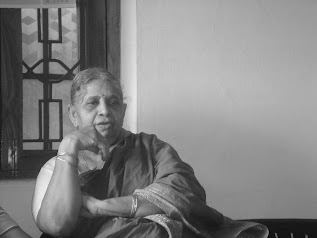Letting Her Go
Few weeks ago I was in the emergency room in the local hospital for a minor ailment. While waiting to be hauled for a CT scan, I overheard a nearby patient give his year of birth to the nurse. It was 1935, the same year my mother was born. For a few moments I was glad and then sad; glad, because someone purportedly of my mother's age is still living, sad because my mother is not. Of course, it is a known fact that the average life expectancy in India is about a decade lower than that in the US (69.7 versus 78.9 years, to be exact).
My mother died on Feb 26, 2013, in the ICU of a hospital in our hometown in India, two-and-half hours after I reached her bedside. About fifty hours earlier, she called me as she was getting ready to be transported to the hospital by ambulance. All she could say was that she was having shortness of breath and waiting to be rushed to the hospital. I did not realize at that time that it was meant to be our last conversation.
In the summer of 2010, Atul Gawande, the famous physician-writer from Boston published a very poignant, investigative article complete with patient narratives, in the New Yorker, offering glimpses into the struggles of seriously ill patients and their family care-givers. Gawande contended that patients are likely to live longer in hospice care than with the therapies modern medicine can offer. As a regular reader of the magazine, I promptly read the article and was convinced of the logic. Today, a decade after its publication, the article remains one of the most read in that prestigious magazine demonstrating its impact; so, it is no wonder that the message is etched in my head.
On the 18-hour flight from JFK to my hometown in India, I was consumed with the thoughts of my mother’s medical condition and the good and bad times she had. My mother had her first heart attack back in 1996. Two years later, my father accidentally died. While my father was living, her life’s purpose was to follow him in word and deed. After his death, as she told me oftentimes, her purpose became helping the grandkids grow and try to stay as healthy as she can so as not to become a burden to anyone. She tried to keep herself in good spirits by performing regular household chores and having long conversations on the phone most of the day with friends and relatives. She reserved one full day every week to visit a few in my brother’s car with the personal driver. Because hospice care is a rarity in a country like India, she brought that type of care home by herself - the pharmacist, therapist, family doctor, and even the cardiologist were just a phone call away. She also felt comfort finding true care-givers in my brother and sister-in-law with whom she lived since my brother got married and help raise their two daughters. As for me, I would talk to her on the phone daily for 15 minutes before setting off to work and take care of all her financial needs. What excited her the most in the later years was the long-distance relationship she closely maintained with the three great-grandchildren, who used to visit her almost every year and spend several weeks with her; this, in fact, I believe, extended her life by a few years.
When I reached the hospital from the airport, I was silently greeted in the lobby by several relatives and well-wishers who were waiting to see me reunited with my mother. My mother was already in a coma that was induced the day before to place her on dialysis. When I went to her bedside, the nurses told me to sit with her and talk to her as normal. I spent an hour holding her hands and by then it was obvious to me that if my mother survives and gets discharged, she would be bedridden and need to be under constant care. When we were joined in the room by my brother, who has been there since my mother was admitted, I told him of this possible scenario and that it is something my mother would never want to happen. An hour later, two attending doctors came by and spent 45 minutes explaining my mother’s condition and the additional procedures they had planned for the next few days. After patiently listening to them, I told the doctors that extending treatment may not be good for her body, and in my opinion, it is time to let her go. We all agreed to see how the situation develops overnight. Within 30 minutes of us stepping out for fresh air, we were urgently called back into the room as my mother’s pulse rapidly started falling down. As we three (me, my brother, and sister-in-law) held her hands and while we were watching in sorrow and horror my mother’s heartbeat fell to zero and she was pronounced dead.
Back at the time when I read Gawande’s article, little did I suspect its significant impact in shaping one of the important decisions I ever made, that of letting my mother go. Sometimes I wonder if she heard me talking to her or to the doctors, although I have never seen or read about any medical evidence that someone in a coma can hear. Often when I talk to my cousins, nephews, nieces, and friends, they remind me of how strong my mother was; for them, she still remains a pillar of strength.



A sorrowful reflection. Now add another recollection highlighting the vibrant life she led and her positive role as a wife, mother, grandma and as a cheerleader for those who knew her.
ReplyDeleteThanks for the comment
Delete